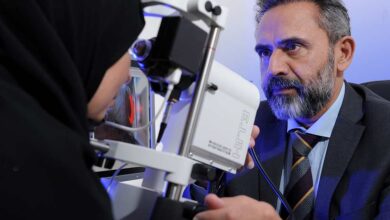

Faculty at Weill Cornell Medicine – Qatar (WCM-Q) have collated information about the novel coronavirus – and suggested lessons that humanity could learn from the current crisis.
Led by Dr. Ali Sultan professor of microbiology and immunology at WCM-Q, the team worked with colleagues at Qatar’s Ministry of Public Health to gather known facts about the virus’ epidemiology, individual countries’ responses to the outbreak and their success, as well as treatments and potential vaccines. From this the researchers compiled a list of actions that could help prevent or mitigate future pandemics.
Dr. Sultan said: “If we are to combat the novel coronavirus we have to understand it in its totality. This means understanding its transmission rates, whether they can be reduced with measures like face masks, the benefits, if any, of the currently available drugs, and the effectiveness of the social distancing measures that we have seen implemented across the world.
“In conjunction, of course, we must understand the pathology of the virus and how this can be treated and, if possible, prevented using a vaccine. Often this kind of information is fragmented but in this research paper we have tried to collate the pertinent facts so that they are all in one place. Our publication came about as a result of ongoing scientific collaborations with our colleagues at Qatar’s Ministry of Public Health.”
Another member of the team at WCM-Q, Dr. Triggle, professor of pharmacology, said: “Challenges in writing our paper included the speed in which the news of the pandemic was changing daily combined with the need to separate the science-based data from potentially misleading information that was appearing in the media as a result of the rush to publish and report.”
The research team has documented the virus’s incubation period, its symptoms, its transmission rates and how the very strict social distancing measures imposed by countries like China, Vietnam and South Korea have been effective in curbing the virus’ spread, unlike the slower and more relaxed measures introduced by Western nations, particularly the UK and the United States.
But perhaps the most important section of the research paper deals with the lessons that must be learned across the world if we are to manage potential future pandemics.

These are:
1. Establishing a rapid reporting system for any unusual infectious outbreak, and notification of the WHO should be a high priority.
2. Immediately isolating the infected person(s) and identifying and quarantining individuals who have been in contact with them.
3. When a viral spread has occurred, testing should be introduced and immediate lockdown considered.
4. If the spread of the infection is wide, social distancing and travel restrictions imposed along with restrictions on public gatherings. This needs public support alongside enforcement.
5. The early genomic identification of the pathogen is important and can help to determine and develop the best treatment options.
6. Vaccine development could be enhanced by pursuing any progress and clinical trials made with previously developed vaccines.
7. Drug development programs should be enhanced and serve to identify and test compounds effective against coronaviruses and other zoonotic viruses.
8. A global network should be established to ensure there is sufficient personal protective equipment and hospital equipment available to countries to deal with a pandemic.
Dr. Triggle said: “The response to COVID-19 has been varied across the world and this has resulted in wildly different infection and mortality rates. Asian countries have dealt with the virus much more effectively than the West, but only with the implementation of strict social measures, which could be interpreted as a curtailment of basic freedoms. However, far fewer people have died so this may be something that the public must accept.
“The most important, though, thing is that we understand what measures have worked, what have failed and why, and that we have a united, global response to potential epidemics and pandemics in the future.”
The work has now been published on open access as a mini-review in the journal of the American Society for Microbiology, mSphere and can be read in full at https://msphere.asm.org/content/5/3/e00317-20.abstract
















